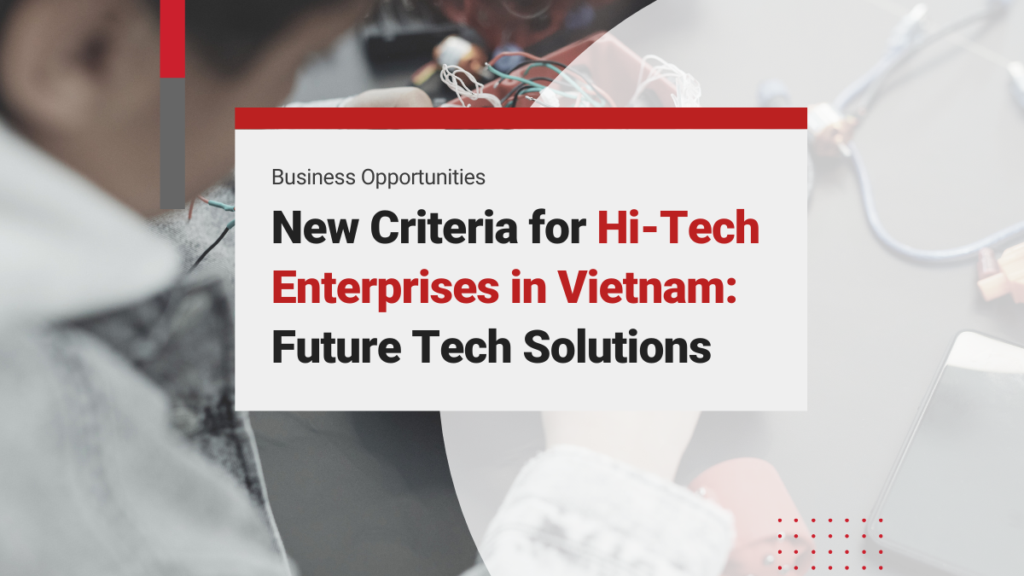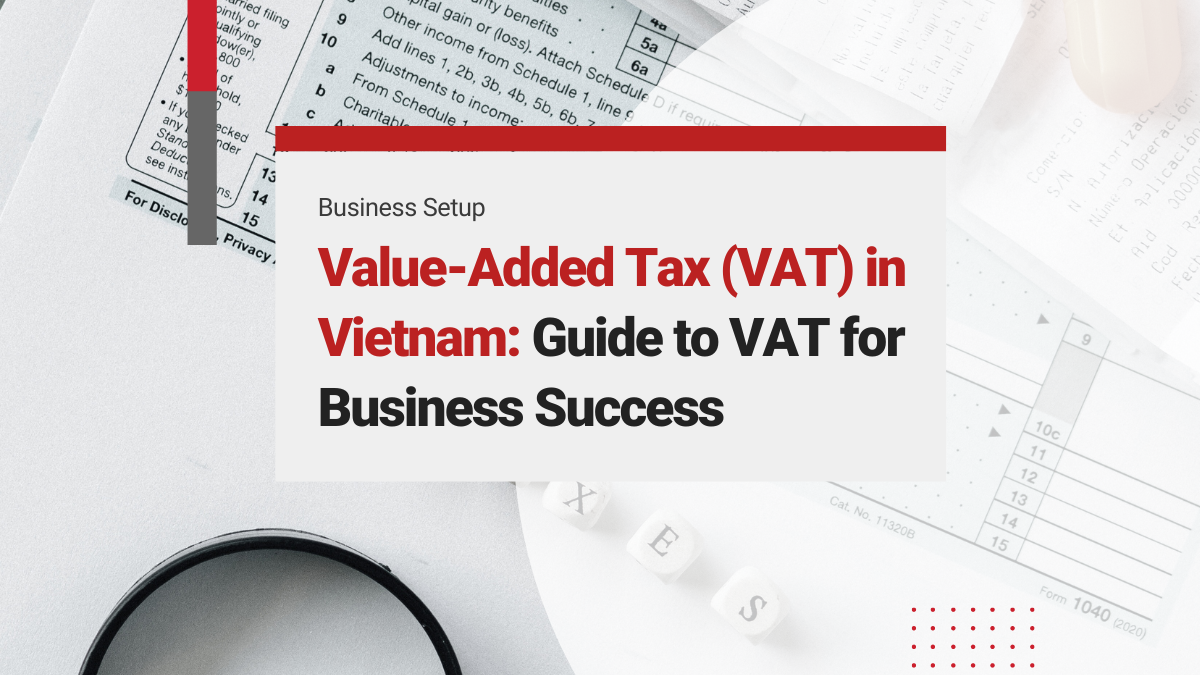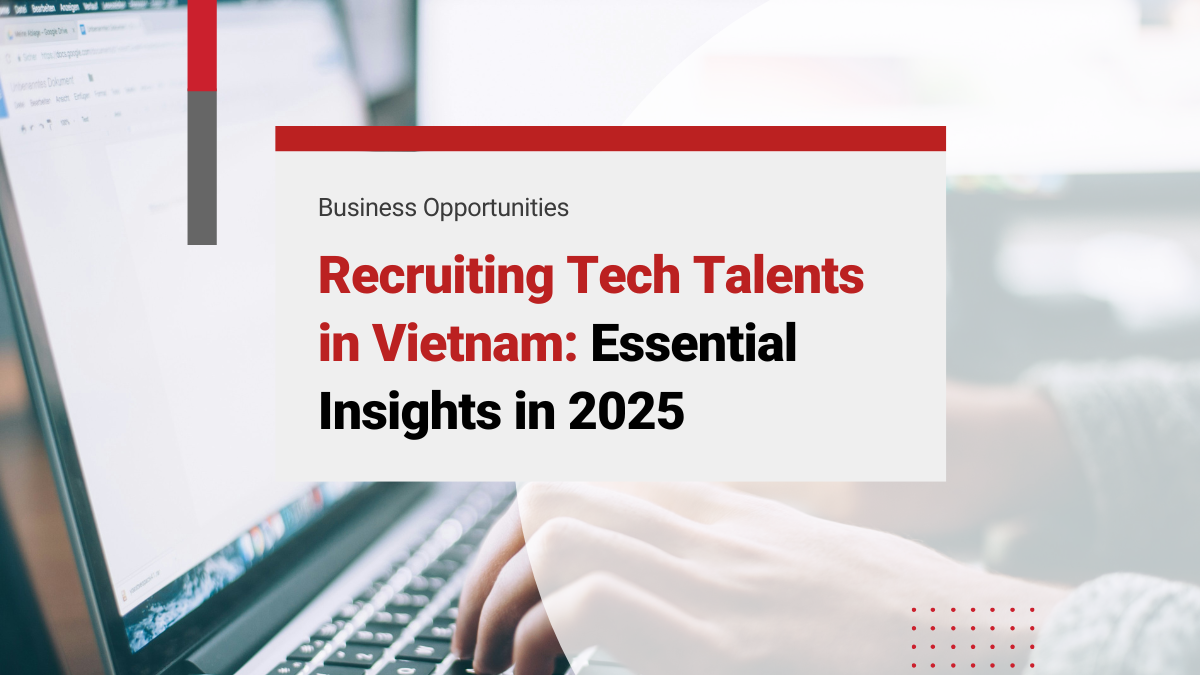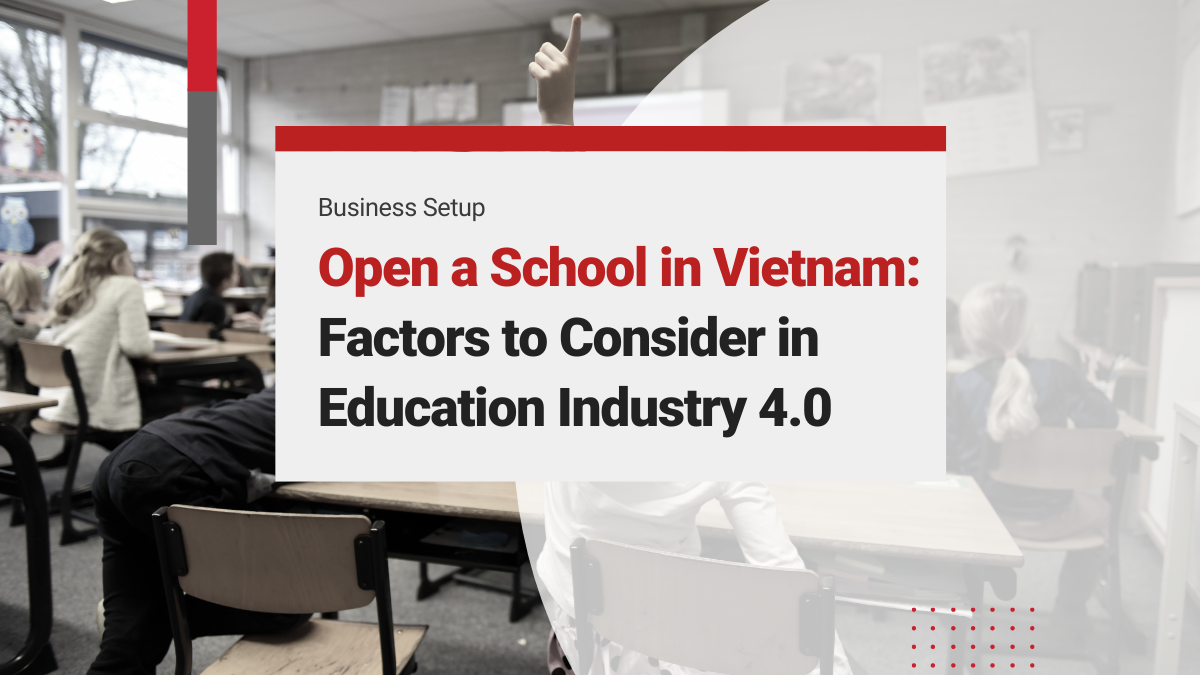Vietnam’s technology sector is experiencing significant growth, driven by innovative startups and advanced ventures across the country. This progress is fueled by forward-thinking government policies and strategic programs that have attracted both domestic and international investments. As a result, Vietnam has emerged as a key player in Asia’s tech industry, securing major investments from global leaders like Samsung, Microsoft, Intel, Jinko Solar Technology, AT&S, and LG. To further boost the sector, Vietnamese authorities have implemented targeted incentives and criteria that have successfully drawn foreign capital into the country’s hi-tech industries.
In today’s digital transformation era, technology-focused businesses are key drivers of economic growth, contributing significantly to the nation’s revenue. Obtaining a High-Tech Business Registration Certificate in Vietnam involves meeting various detailed requirements. This article provides a detailed examination of the regulatory frameworks and the process for establishing technology firms in Vietnam.
Interested in Hi-Tech in Vietnam? Check out InCorp Vietnam’s Incorporation Services
What is a Hi-tech Industry?
The hi-tech industry encompasses economic and industrial sectors that prioritize technological innovation and advancement. According to research by the Workforce Information Council, this sector is characterized by a high concentration of workers in STEM (Science, Technology, Engineering, and Mathematics) fields. This industry focuses on developing cutting-edge products in electronics, software, hardware, robotics, AI, and biotechnology, driven by significant R&D, innovation, and rapid product evolution.
The scale of the hi-tech industry is remarkable, with an estimated annual value of approximately US$4 trillion – comparable to the GDP of major economic powerhouses like Germany, Japan, China, or the United States. While over 30,000 companies worldwide participate in this industry, it’s noteworthy that the majority are small operations with fewer than five employees.
Manufacturing in the hi-tech sector has historically been concentrated in Asia, with the region producing about 90% of final hi-tech products and 80% of components. However, recent concerns about supply chain vulnerability have prompted initiatives to diversify production locations, with significant government support through various “chip acts” in Europe and the United States.
Read More: Guide to Setting up a Manufacturing Busines in Southeast Asia
The impact of hi-tech extends into traditional manufacturing sectors as well. For example, the automotive industry has incorporated advanced robots on assembly lines to improve efficiency and precision, while the chemical industry utilizes electronic controls powered by hi-tech solutions for refining and smelting processes.
The pace of technological evolution continues to accelerate, with ongoing developments in artificial intelligence – particularly machine learning and natural language processing – expected to become more prevalent. The rollout of 5G technology is anticipated to fundamentally transform how we live, work, and interact with technology.
According to the Law on High Technologies of 2008, a hi-tech enterprise is defined as one that produces hi-tech products, provides hi-tech services, or conducts research and development in high-technology fields. Notable examples of such enterprises include global corporations like Intel, LG, and Samsung, as well as companies like Viettel, FPT, and Thegioididong in Vietnam.
The industry is characterized by continuous learning and adaptation, with IT professionals constantly updating their skills to keep pace with emerging technologies and changing requirements in an increasingly contactless world.
Read Related: Vietnam’s Electronics Business Sector: Investment Trends from Chinese Electronics Manufacturers
Hi-tech Industry in Vietnam
Vietnam’s hi-tech sector is growing rapidly, with Saigon Hi-Tech Park (SHTP) progressing through key stages. Ongoing evaluations of 1/500 scale construction plans and updates to registration certificates ensure projects stay on schedule. On January 6, construction began on a plasma-derived biopharmaceutical facility at SHTP, set to begin operations by February 2026. With a capacity to process 6,000 liters of plasma annually, it will meet the medical needs of 250 million people, strengthening Vietnam’s health infrastructure and reducing reliance on imported pharmaceuticals.
SHTP has attracted investment from over 10 global tech leaders, including Intel, Jabil, and Rockwell (USA); Nidec, Nipro, and NTT (Japan); Samsung (South Korea); Sanofi (France); and TTI (Germany). The park currently hosts 160 active projects, with a total value of US$12.3 billion. Vietnam’s largest city Ho Chi Minh is developing a new 200-hectare science and technology park in Thu Duc City, 2 km from SHTP, to boost investment in hi-tech industries and support sustainable growth. In 2024, Vietnam secured billions in investments from global tech leaders, reinforcing its status as a manufacturing and innovation hub.
Read More: Why Ho Chi Minh City Is Vietnam’s Top Choice for Entrepreneurs
Amkor Technology invested an additional US$1.07 billion to expand its operations, strengthening Vietnam’s role in the global semiconductor supply chain. LG Electronics committed US$2.35 billion to expand its electronics presence, while Foxconn invested US$550 million in new smart device facilities in Quang Ninh. Samsung, Vietnam’s largest foreign investor, allocated US$1.8 billion to expand LED display production in Bac Ninh.
These investments have boosted Vietnam’s manufacturing capabilities, created thousands of jobs, and strengthened the tech ecosystem. Notably, NVIDIA’s acquisition of AI startup VinBrain has enhanced Vietnam’s AI and healthcare tech. Alongside this, the Vietnamese government partnered with NVIDIA to establish an AI Research & Development Center and an AI Data Center, marking a significant step in Vietnam’s AI leadership
Other major tech companies, including SpaceX (US$1.5 billion investment in satellite internet), Alibaba (plans for a data center), and Google (established Google Vietnam), are strengthening Vietnam’s position as a regional tech hub. In late 2024, the government issued Resolution 57, prioritizing science, technology, innovation, and digital transformation for national development. With a stable economy, business-friendly policies, and a skilled workforce, Vietnam is on track to become a leading technology destination in Asia.
Criteria for the Hi-Tech Industry: Solutions & Standards for Enterprises
To be classified as a hi-tech enterprise in Vietnam, businesses must satisfy specific conditions as outlined in the Law on High Technology, the Law on Investment, and Decision No. 10/2021/QD-TTg (effective from April 30, 2021). This regulation aims to support hi-tech investments as more companies relocate to and establish operations in Vietnam, making it easier for both domestic and international businesses to benefit from the excellent incentives offered to hi-tech companies.
Core Revenue Requirements
A fundamental criterion for hi-tech classification is that at least 70% of a business’s total yearly net revenue must come from the sales of hi-tech products. For the first three years, enterprises must achieve at least 60% of total annual turnover from hi-tech products, and from the fourth year onward, this percentage must reach 70% or more.
Research and Development Expenditure Criteria
Enterprises must allocate a specific portion of their revenue to research and development (R&D) activities conducted in Vietnam. The percentage requirements vary based on company size:
| Total Capital | Number of Employees | Minimum R&D Expenditure Ratio |
| VND 6 trillion ($260.87 million) or more | 3,000 or more | 0.5% |
| VND 100 billion ($4.35 million) or more | 200 or more | 1% |
| All other companies | – | 2% |
The average total expenditure for R&D activities must reach at least 1% of total annual revenue over three consecutive years, and from the fourth year onward, it must exceed 1% of total revenue.
Read More: An Extensive Guide to Industry Capital & Deposit Requirements in Vietnam
Calculation of R&D Expenditure
The total expenditure on research and development activities includes:
- Depreciation of investment in infrastructure and fixed assets
- Annual recurrent fees for research and development activities
- Fees for training and training support for R&D workers in Vietnamese institutions
- Fees for copyrights, transfer of ownership rights, and industrial property rights for R&D activities
- Fees for patent recognition or protection of inventions in Vietnam
Workforce Qualification Requirements
Hi-tech enterprises must maintain a qualified workforce with specific educational credentials:
- The number of employees with professional degrees (university or higher) directly conducting research and development must reach a minimum percentage of the total workforce:
- For enterprises with a total capital of VND 6 trillion and 3,000+ employees: ≥ 1%
- For enterprises with a total capital of VND 100 billion and 200+ employees: ≥ 2.5%
- For all other enterprises: ≥ 5%
- Qualified R&D employees must have:
- At least a vocational college degree or higher
- A labor contract with a duration of at least 1 year or an indefinite-term contract
- The proportion of employees with vocational college degrees must not exceed 30% of the total workforce.
Hi-Tech Product Qualifications
To be considered a hi-tech enterprise, the business must produce products that are on the official list of hi-tech products encouraged for development. These products must satisfy the following conditions:
- Have a high proportion of added value in the product value structure
- Demonstrate high competitiveness and great socio-economic efficiency
- Have strong capability for export or substitution of imported products
- Contribute to improving national scientific and technological capacity
Benefits of Hi-Tech Classification
Businesses that meet these criteria and are officially recognized as hi-tech enterprises become eligible for various tax incentives and support mechanisms provided by the Vietnamese government. This classification helps promote advanced technological development and innovation within the country’s industrial landscape.
Implementation Timeline
The detailed criteria specified in Decision No. 10/2021/QD-TTg have been in effect since April 30, 2021. Enterprises seeking hi-tech status must document their compliance with these standards during the application process and maintain these standards to preserve their hi-tech classification.
Procedures for Registering a Hi-Tech Enterprise in Saigon Innovation Hub and Hoa Lac Hi-Tech Park
A high-tech enterprise will be deemed successfully established when the business owner receives the High-Tech Enterprise Certificate. This certificate serves as official recognition of the enterprise’s status.
Essential Documentation Required
To apply for a High-Tech Enterprise Certificate, the following documents must be prepared:
- An application for recognition of a hi-tech enterprise, submitted in the precise format required by the Ministry of Science and Technology
- Notarized copy of Business Registration Certificate, Investment Certificate, or Certificate of Science and Technology Enterprise
- A formal declaration confirming that the company has fully complied with all requirements outlined in Clause 1, Article 18 of the Law on High Technology
Important Procedural Notes
- The application package must be delivered either in person or by postal service to the Ministry of Science and Technology for proper consideration
- The Ministry has the responsibility to notify the business owner in writing if the application contains deficiencies or is incomplete, with a request to address and correct any inaccuracies
- The Ministry of Science and Technology is tasked with evaluating applications and granting the Certificate of a high-tech firm within 30 days from when a complete application is accepted
Detailed Procedures for Applying for a High-Tech Enterprise Registration Certificate
Step 1: Document Preparation
Prepare 01 original dossier and 01 photo dossier containing the following components:
- Application for recognition of a high-tech enterprise according to the official form prescribed by the Ministry of Science and Technology
- Notarized copy of Business Registration Certificate, Investment Certificate, or Certificate of Science and Technology Enterprise
- A detailed explanation demonstrating that the enterprise has fully met all conditions specified in Clause 1, Article 18 of the Law on High Technology
- Supporting documentation of research and development activities carried out within Vietnam
- Financial statements of the enterprise (certified by an auditor) Note: the enterprise must have been operating for at least 01 year
- Detailed dissection reports on costs related to conducting research and development activities and revenue generated from high-tech products
- Comprehensive records of the workforce engaged in research and development activities (including a complete list and diplomas)
- Records of the quality management system implemented within the enterprise
- Dossiers detailing product quality standards applied by the enterprise
- Dossier explanation demonstrating compliance with the standards and technical regulations of the environment and energy-saving
Step 2: Application Submission
Submit the complete application package through one of the following methods:
- In-person
- By post
- Through the National Public Service Portal
Step 3: Review Process by the Ministry
The Ministry of Science and Technology will:
- Collect opinions from relevant ministries and People’s Committees
- If the dossier is found to be incomplete, issue a letter requesting supplementation and completion
- This letter will be sent directly or by post to the enterprise
- The enterprise has 10 working days from receipt of the request to supplement, repair, and return the updated materials to the Ministry
- When necessary, the Ministry may organize meetings with concerned ministries, sectors, and People’s Committees of provinces and centrally-run cities to clarify issues mentioned in the application
Step 4: Appraisal and Certificate Issuance
- Within 30 days from the date of receiving complete dossiers, the Ministry will appraise and grant high-tech enterprise certificates
- The certificate will be sent to the successful enterprise
- In cases where a certificate is refused, the Ministry must notify the reason in writing to the applicant enterprise
Tax Incentives for Hi-Tech Enterprises in Saigon Hi-Tech Park Training Center & Beyond
High-technology enterprises in Vietnam can benefit from significant tax exemptions and reductions during their first fifteen years of operation, with the incentives beginning once they’ve received official certification.
Two Qualifying Pathways for Tax Reduction
1. Location-Based Incentives
Enterprises that implement new public sector projects in disadvantaged or significantly impoverished geographical areas (as specified in the Appendix of Decree No. 218/2013/ND-CP) qualify for special tax treatment.
2. Technology-Based Incentives
Businesses can qualify through technological advancement by obtaining either:
- Certificate of Hi-tech Enterprise
- Certificate of Agriculture Enterprise Applying High Technologies
Read More: Maximize Benefits: A Complete 2025 Guide to Tax Incentives in Vietnam for Foreign Companies
Corporate Income Tax (CIT) Incentive Structure
The 15-year incentive period is structured as follows:
Years 1-4: Complete tax exemption (0% CIT)
Years 5-13: 50% reduction on the preferential 10% tax rate (5% CIT)
Years 14-15: Low preferential rate (10% CIT)
Years 16+: Standard rate (20% CIT)
Additional Benefits for Hi-Tech Enterprises
Land Rental Exemptions
According to Circular 333/2016/TT-BTC, certified hi-tech enterprises may receive a complete exemption from land rental fees for the entire lease term when the land is used for constructing scientific research facilities, provided they meet the relevant conditions for scientific and technological activities.
Import Tax Exemptions
As per the Law on Export Tax and Import Tax 2016, hi-tech enterprises receive a five-year exemption from import taxes on essential raw materials, supplies, and components that:
- Cannot be domestically produced
- Are necessary for production
- The exemption period begins from the commencement of production
These incentives aim to foster innovation and technological advancement while promoting development in underprivileged areas of Vietnam.
How Can InCorp Vietnam Assist?
Vietnam’s generous tax incentives for high-tech enterprises and businesses in disadvantaged areas offer a significant competitive advantage for forward-thinking companies, with benefits including four years of complete tax exemption, nine years at a reduced 5% rate, two years at a preferential 10% rate, plus valuable exemptions for land rental and import taxes.
Successfully accessing these incentives, however, requires expert navigation of Vietnam’s regulatory environment—which is where InCorp Vietnam excels as a leading provider of market entry services, backed by our parent company’s presence across 8 Asia-Pacific countries, over 1,100 legal experts, and more than 15,000 satisfied corporate clients throughout the region. From securing high-tech certifications to implementing strategic tax planning and ensuring ongoing compliance, our team provides the transparent, locally-informed guidance needed to position your business for maximum benefit and sustainable growth in this dynamic market—contact us today to discover how we can help your company thrive while taking full advantage of Vietnam’s preferential tax treatment.

clients worldwide

professional staff

incorporated entities in 10 years

compliance transactions yearly
Learn the Right Setup for Business
Expansion in the Vietnam
Frequently Asked Questions
Is Vietnam Technologically Advanced
- Vietnam is rapidly advancing in technology, particularly in areas like information technology, electronics, and telecommunications. The country has a growing startup ecosystem and strong government support for digital transformation.
What Are The Requirements For Applying For A High-tech Enterprise?
- To apply for high-tech enterprise status, a company typically needs to be registered in the country, own core intellectual property, engage in R&D activities, meet specific revenue thresholds from high-tech products or services, and maintain a qualified workforce. Detailed criteria may vary by region or country.
What Does Hi-tech Mean
- Hi-tech, short for high technology, refers to advanced technological development, especially in electronics, computing, and telecommunications. It typically involves cutting-edge innovations and sophisticated equipment.






